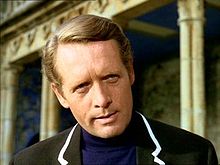It is easy to over-analyse “The Prisoner”, and many fans have. A banner at a recent anti-lockdown march in London proclaimed (but garbled) Number 6’s cry of defiance: “I am not a number: I am a free man!” According to Andrew Pixley’s guide to the series, over-interpretation of the story irked its two creators, Patrick McGoohan, the star and executive producer, and George Markstein, the script editor.
很容易会过度分析《六号特殊犯人》,很多粉丝都会这样。最近在伦敦举行的一次反封锁游行上,一条横幅上写着6号的反抗口号(但是乱七八糟的):“我不是一个数字:我是一个自由的人!”根据安德鲁·皮克斯利对该电视剧进行的阐述,对故事的过度解读激怒了该剧的两位创作者,明星兼执行制片人帕特里克·麦古汉和剧本编辑乔治·马克斯坦。

Nevertheless, they plainly wanted to make their viewers think. “The Prisoner” invites you to ponder the relationship between the individual and authority— though you needn’t conclude that a coronavirus lockdown amounts to a conspiracy against the people. The potential abuse of technology and surveillance is a recurring theme. The inhabitants of the village can be observed night and day; in one episode they absorb a history course, beamed from their televisions directly into their brains, within seconds.
然而,他们明显想要让观众去思考。《六号特殊犯人》引导你去思考个人和权威的关系——然而你不必断定冠状病毒的封锁等同于针对人民的阴谋。技术和监视的潜在滥用是一个反复出现的主题。这个村庄居民们日夜被监视。某一集中,他们掌握了一段历史,只用几秒的时间就能把历史从电视中传入他们的大脑。
At bottom, “The Prisoner” remains a bizarre yet brilliant TV classic, about a spy whose masters won’t let him go. Though expensively made for its time—it was shot in colour and on location—it still has plenty of flaws. The plot can be downright confusing, not least in the final unmasking of Number 1. But it has an abundance of charms, including its picturesque setting in Portmeirion, north Wales. Above all it has McGoohan’s steel-gazed, black-blazered hero, railing indomitably against his captors. Does he finally escape? Watch it, and see for yourself
实质上,《六号特殊犯人》仍然是一部奇异而精彩的电视经典剧,讲述的是一个间谍的主人不让他离开的故事。尽管拍摄费用昂贵,拍摄的颜色和地点都价值不菲,但这部电视剧仍存在许多缺陷。情节可能非常混乱,尤其是在最后揭幕1号的时候。但它还是魅力非凡,包括它采用了北威尔士的波特梅里翁风景如画的背景。最重要的是,这部剧集中的麦古汉眼神如钢铁般冷硬,他是个黑色火焰般的英雄,一直不屈不挠地抨击抓捕自己的人。他最终逃走了吗?你自己亲自看看吧。
译文由可可原创,仅供学习交流使用,未经许可请勿转载。













